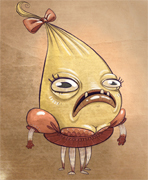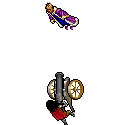HIJK posted:It's so weird how Rothfuss manages to absorb all this media and yet doesn't understand what makes it work. He attends writing workshops and yet only goes through the process without understanding what the process is trying to teach him. "Destroy the world" indeed. I think the point everyone saying "hurf a durf how is this guy even published" is missing is that compared to the majority of fantasy authors, Rothfuss is actually pretty drat good. Are there better authors? Of course there are. Rothfuss is no Tolkein, by any stretch of the imagination. Are there worse authors? Hell yes. And their stuff gets read in the same volume (or more!) as Rothfuss.
|
|
|
|
|

|
| # ? May 27, 2024 09:50 |
|
Rothfuss's editors are actually hugely successful - just not artistically. Rothfuss doesn't have the appeal of even the trashiest genre stuff. I'd honestly read a Drizzt book instead any time.Nakar posted:Writing myth is really hard because people don't usually set out to just write myths. You have to come up with a mindset that replicates generations of oral transmission or else just have that particular flair for simple poetry that makes something sound mythical instead of just trite and cutesy. I've tried to do it and even with references to model on stylistically (Homer, the Bible, etc.) it always reads like idiotic overwrought bullshit. There are very few people even remotely capable of doing it well. One of those things, like poetry, where you're better off eliding it if you're no good at it. The thing about myth is that people really misunderstand it. Myth isn't loading everything with power and significance, but the opposite. Mythic storytelling is only what is significant. There are no frills or pretences. This is what resonates in oral storytelling, in epics, in sagas, in fairy-tales, etc. This is how the Norse described an army of evil gathering: Saga of King Hrolf Kraki posted:Meanwhile Skuld assembled a troop of the best fighters as well as the worst rabble from neighbouring provinces. This treachery was concealed so that King Hrolf was completely unaware of it. Likewise the champions suspected nothing, because it was done with the most skilful magic and sorcery. Skuld, to overpower her brother King Hrolf, fashioned a spell of high potency, which summoned elves, norns and countless other vile creatures. No human power could withstand so strong a force. These are some of the biggest influences on Tolkien stylistically. Also, 
BravestOfTheLamps fucked around with this message at 21:59 on Mar 3, 2016 |
|
|
BravestOfTheLamps posted:Rothfuss's editors are actually hugely successful - just not artistically. Rothfuss doesn't have the appeal of even the trashiest genre stuff. I'd honestly read a Drizzt book instead any time. Not even maybe.
|
|
|
|
|
|
|
|
|
Cyclomatic posted:I'm guessing the point of the fire thing is to make the point that he knowingly destroyed what he thought to be valuable to someone he had a feud with, and then tried to kill him with fire, only for there to be no moral component. Which I took to be the point. Ivory tower types have a very hard time with that. Nihilism is the rejection of meaning, and is based on the idea of refuting something. It is like the atheist, who believes in the rejection of belief, and simply can't understand the instinctive agnostic who simply doesn't view the world in terms of belief. Yeah you lose any credibility when you start talking about how "ivory tower types" don't get nihilism. Here's a hint, nihilism is more then just a high school level "there is no meaning" and the only people seriously discussing it are, you guessed it, Ivory tower types.
|
|
|
|
It is like the atheist, who believes in the rejection of belief
|
|
|
|
LET’S READ THE KINGKILLER CHRONICLE CRITICALLY Part 13: “’Witnessed,’ said the second priest...“ In Chapter 27, “His Eyes Unveiled”, Kvothe leaves the inn. He is gleefully happy as he now has something to look forward in life. Of course stories and happiness jar something in him: quote:But as I sat there, I felt a vague unease creep over me. A feeling that I was forgetting something impinged on my too-rare happiness. I tried to ignore it, but it stayed with me all day and into the next, like a mosquito I couldn’t see, let alone swat. By the end of the day, I was certain I had forgotten something. Something about the story Skarpi had told. Now a lot of people will claim Kingkiller is a coming-of-age story or even a bildungsroman. This would imply that the book is about Kvothe’s development. It is not, as is evident from how it contradicts with the text. Look at what I’ve bolded: as we will see, the Tarbean sequence features only a warped version of Kvothe. His life in Tarbean is merely him being suppressed, and has no actual effect on his development. The actual metaphor used in the text is that he awakens and throws away his old clothes. There will be nods to the skills he learned in the streets, but not to how it has affected his personality and his lifestyle. There is no ruthless survivor’s instinct or “iron-hard practicality” after this. Kvothe will in a future chapter claim that financial insecurity at a privileged academic institution represents poverty! It’s also another part of Rothfuss’s bizarre treatment of class. Poverty, in his grand scheme, is an unreal and nightmarish exile from society: Kvothe remains an outsider in Tarbean, without relationships to other people. Everyone else is either hostile to him or a charitable soul who will soon exit the narrative. There is no real comprehension of class or society. Other street urchins will congregate together, but they’re either violent or unknowable. Approaching the Church for charity is brushed off with a brief mention about how Kvothe heard rumours about them. All is explained by Kvothe losing his family and spending half a year in wilderness. Rothfuss will attempt to add some class satire soon, which mostly falls flat. Kvothe secures some money and drinks a beer, and sees a priest wearing a cowl. Kvothe wishes to avoid for being drunk and a thief. But the priest happens to look in his direction, holding a torch, and Kvothe is struck by the image of a man’s face covered in shadow. For the first time he recalls the Chandrian, and remembers that their leader was called Haliax. quote:They had killed my parents for gathering stories about them. They had killed my whole troupe over a song. I sat awake all night with little more than these thoughts running through my head. Slowly I came to realize them as the truth. Some people will tell you that Kingkiller subverts the conventions of fantasy epics. These people are not entirely wrong. The impetus driving the narrative is the protagonist’s family being killed by comic book villains. But Kingkiller subverts this: the bulk of its narrative does not involve the Chandrian, or Kvothe’s quest for revenge. Rothfuss has successfully overcome clichés such as “plot”. In Chapter 28, “Tehlu’s Watchful Eye,” Kvothe rushes in for Skarpi’s next storytelling session. Skarpi is continuing after the story of Selitos after the fall of his city. Selitos is looking for help from God, along with his companions. They wish for power to avenge themselves on Lanre/Haliax, but God demands that they must act impartially and not for personal vengeance. quote:Selitos went to Aleph and knelt before him. “I must refuse, for I cannot forget. But I will oppose him with these faithful Ruach beside me. I see their hearts are pure. We will be called the Amyr in memory of the ruined city. We will confound Lanre and any who follow him. Nothing will prevent us from attaining the greater good.” quote:They came to Aleph, and he touched them. He touched their hands and eyes and hearts. The last time he touched them there was pain, and wings tore from their backs that they might go where they wished. Wings of fire and shadow. Wings of iron and glass. Wings of stone and blood. Now this is undoubtedly all foreshadowing, and the identities and activities of the Amyr are subject to speculation by fans. Like I said, I won’t engage in fandom theories because it’s a poor substitute for artistic analysis. All of this mythmaking is actually irrelevant without further entries in the series, and can be safely ignored. Was Kvothe protected by the Amyr in Chapter 22? It doesn’t really matter that much. The story is brief but as overwrought and unfocused as the Lanre myth. Skarpi’s story is interrupted by the Inquisition, who charge him with heresy. There’s a lot of incidental dialogue with priests agreeing with each other and threatening the innkeeper. Skarpi is bound, but not silenced: quote:“Do not speak his name!” the Justice screamed, his face a livid red. “Your mouth dirties it. It is a blasphemy upon your tongue.” Skarpi tells Kvothe to run and he proceeds to do exactly so. Another false claim often made about Kingkiller is that it has good world-building, or world-building at all. “World-building” in itself is something lovers of genre fiction obsess over without really understanding it. They mistake it for an end in itself. Of course, the point of any world-building is to help tell a story, and not to fabricate a “living, breathing world” as hacks will claim. Tolkien uses Middle-Earth for a quite distinct effect. The whole Middle-Earth mythos is about loss and decline. It’s one of the cruellest stories I know: Tolkien creates wonders, only to tell how they will all be lost. How does this relate to the Inquisition? Well, the narrative of Kvothe’s youth has been set in “the Commonwealth”. This is where his family was killed, and where Tarbean is located. The Commonwealth is also home to the University, which is a secular academic institution and where magic is practiced and taught. In fact, the University is only a few days of travel away from Tarbean. The Inquisition operates a few days of travel away from the secular institution of magical arts. Some people will tell you that Kingkiller’s world-building is enchanting because it feels real, because of the little touches. These people are idiots. I don’t recall the narrative explanation for this inconsistency. Some fans offer conspiracy theories about how the University was established and is protected by the Amyr. But again, it doesn’t matter. It doesn’t make much sense artistically. Once again we must consider if this is satire or ironic, but the story presents this straight and in concrete terms. The real explanation is that Kingkiller’s world is not a world, but a collection of motifs and sets that do not relate to each other, logically or aesthetically. It is a collection of trivia and props, mere paraphernalia. There is no central theme or idea to it. Middle-Earth, in Lord of the Rings, is sparse and wild to reflect the loss and decline it faces. In the Fafhrd and Gray Mouser stories, Nehwon is dream-like in its simultaneous closeness and vagueness, which allows for easy turns from jolly satire to nightmare. Huckleberry Finn’s south is home to every kind of foolishness. The search for meaning becomes mired in chaos and violence in Umberto Eco’s Medieval Europe, etc etc. Religion, too, is represented as either violent or unknowable. This adds a further layer of irony to the University. The institution of the medieval university developed partly out of the Catholic Church. Although universities were generally independent, they still maintained a strong clerical element in them, and education in one became necessary for higher clerics. Now I’m not saying that the absence of clericalism in a fantastical school is fundamentally a flaw, but it is still fascinating in how it reveals something about Kingkiller’s ideological landscape. Kvothe joins the University not soon after observing the Inquisition at work. The Inquisition represent violent parochialism, which Rothfuss denounces several times in the text (consider Kvothe’s dismissal of uneducated rustics when he begins his narration). In Chapter 29, “The Doors of My Mind,” Kvothe begins to finally awaken from the nightmare of lumpenproletariat existence. At this point he discovers his Moby Dick, or Prester John for the Baudolino connection. quote:When I had worn myself out with sobbing it was deep into the night. I lay there looking at the sky, weary but unable to sleep. I thought of my parents and of the troupe, and was surprised to find the memories less bitter than before. Kvothe looks over his possessions, which include his only memento of Ben: quote:As the sun was rising, I removed Rhetoric and Logic from its hiding place underneath a rafter. I unwrapped the scrap of treated canvas I used to protect it and was relieved to find it dry and well. I felt the smooth leather in my hands. I held it to my face and smelled the back of Ben’s wagon, spice and yeast with the bitter tang of acids and chemical salts mingled in. It was the last tangible piece of my past. ROTHFUSSIAN ATTRIBUTES quote:Others came forward. Tall Kirel, who had been burned but left living in the ash of Myr Tariniel. Deah, who had lost two husbands to the fighting, and whose face and mouth and heart were hard and cold as stone. Enlas, who would not carry a sword or eat the flesh of animals, and who no man had ever known to speak hard words. Fair Geisa, who had a hundred suitors in Belen before the walls fell. The first woman to know the unasked-for touch of man. And an old friend from part 2 returns! quote:This the mercenaries did with rough efficiency. BravestOfTheLamps fucked around with this message at 20:41 on Apr 7, 2017 |
|
|
|
BravestOfTheLamps posted:Some people will tell you that Kingkiller’s world-building is enchanting because it feels real, because of the little touches. And thus you make your entire post not worth reading; not worth the electricity powering my monitor to see it. Why not just make your points? Why do you feel this insane need to put everyone else down for looking for different things in a book? Stop lording over everyone else and post your analysis without being an rear end about it.
|
|
|
|
jivjov posted:Why not just make your points? Why do you feel this insane need to put everyone else down for looking for different things in a book? Never met fantasy readers before, have you?
|
|
|
|
Having spent years on the forums of internet comedy site Something Awful, I will not tolerate use of the word idiot and furthermore
|
|
|
jivjov posted:And thus you make your entire post not worth reading; not worth the electricity powering my monitor to see it. you are the gift that keeps on giving, except the gift is bad posts you are the bad post that keeps on posting
|
|
|
|
|
...but Lamps is right, and the comic hyperbole attached to that argument doesn't negate or undermine its validity. Not-Cardinal Ximenez could set out with Cardinals Not-Biggles and Not-Fang on Monday and have that wretched hive of free-thinking scum and villainy shut down before the weekend. So why don't they? Jackbooted oppressors generally don't fart around when it comes to shutting down perceived threats like universities.
|
|
|
|
I'm loving this thread lately.
|
|
|
|
SatansOnion posted:So why don't they? Because they keep having to go out and come in again, and then eventually they have to find someone else (in a toffee-nosed university town no less) who can convincingly say "one o'crossbeams'gone outer-skew on'treadle". And he thinks Rothfuss doesn't understand social class!
|
|
|
|
ChickenWing posted:you are the gift that keeps on giving, except the gift is bad posts SatansOnion posted:Not-Cardinal Ximenez could set out with Cardinals Not-Biggles and Not-Fang on Monday and have that wretched hive of free-thinking scum and villainy shut down before the weekend. So why don't they? Jackbooted oppressors generally don't fart around when it comes to shutting down perceived threats like universities. This would be a much better story.
|
|
|
|
The Arcanum's already on Double Secret Probation, there's nothing more the Cardinal can do.
|
|
|
|
BravestOfTheLamps posted:Now a lot of people will claim Kingkiller is a coming-of-age story or even a bildungsroman. This would imply that the book is about Kvothe’s development. It is not, as is evident from how it contradicts with the text. Look at what I’ve bolded: as we will see, the Tarbean sequence features only a warped version of Kvothe. His life in Tarbean is merely him being suppressed, and has no actual effect on his development. The actual metaphor used in the text is that he awakens and throws away his old clothes. There will be nods to the skills he learned in the streets, but not to how it has affected his personality and his lifestyle. There is no ruthless survivor’s instinct or “iron-hard practicality” after this. Kvothe will in a future chapter claim that financial insecurity at a privileged academic institution represents poverty! I think this disjunction will be crucial to the series, actually. Kvothe's early experiences as a quasi-feral little poo poo keep coming out in little ways. He think he's grown, he thinks he's a good guy, he thinks he's righteous, but he has a fundamental lack of trust in other people that drives him to try to control other people when he ought to be cooperating with them. This in turn gets to the other theme Rothfuss is trying for, which is that stories always lie. None of the stories of the Chandrian are entirely accurate. The story Kvothe tells about himself isn't either. He's not the good guy he claims to be. I expect that if Doors of Stone ever arrives, he'll get his comeuppance. To be clear, I'm not defending Rothfuss' prose style; I think that his reach has significantly exceeded his grasp.
|
|
|
|
That would work if WMF wasn't 100% about how awesome Kvothe is.
|
|
|
|
|
It might still work if all of Doors of Stone is about him being a vindictive poo poo comes back to bite him. So he's a strong, sexy karate wizard, but basically everyone he's ever known has abandoned him for having been a poo poo.
|
|
|
|
It will take a lot of really slick plotting to save the framework of this series in the third novel. Writing prowess that rothfuss has not proven he has. More n likely he ll fumble it, the ending will continue the let down of this series and it will contain a whiny foreword about how people wont understand it and the book is only for special people who 'get kvothe'
|
|
|
|
The thing that really pissed me off about this series(and the way others pitched it to me) is that even in the first book, all the legend-building incidents feel like phony authorial contrivances rather than poo poo that would naturally/believably lend itself to exaggeration. Instead it just seems like a bunch of NPCs stand around waiting for him to give them something to talk up. The "Kvothe the Bloodless" bit was probably the worst offender to me but it always felt like Rothfuss went about the whole thing rear end-backwards If that is actually what he was trying for with the story, he should've drawn from Westerns instead of D&D campaigns
|
|
|
|
|
Yea Kvothe the bloodless is indeed especially egregious and I hope lamp guy brings it up when the time comes because its one of the dumber 'TRUE STORY BEHIND THE LEGEND' bits of the book. So when you hear it you're like wow sounds badass, I wonder why they call him that, and how the legend will be so TWISTED from the TRUTH. Then it turns out he ate a thing that made him not bleed, so the title is literally true, but no one really calls him that and it doesnt really get twisted out of proportion. He probably calls himself that. It doesn't help or hinder him in any way. Its a big wet fart and just another one of those things where the legend and reality are not far apart and theres no way this book is about how stories change or whatever it is people wanna believe. As a contrast, we can look at Monza in Abercrombie's 'Best Served Cold' who Gets the title 'Butcher of Cavile', and through the story we see her use its reputation to her advantage, and ultimately learn she didn't earn it at all it was someone else's order that caused the slaughter which got her the name, but through the story we see the effects it has on her and the people she meets. Conversely in this poo poo, the name means jackall. Jerkface fucked around with this message at 03:57 on Mar 5, 2016 |
|
|
|
Going over what I've posted, I may be wrong about the story having no central theme. The theme might be knowledge and how it sets people apart.
BravestOfTheLamps fucked around with this message at 12:06 on Mar 5, 2016 |
|
|
|
To be honest, I'm not really spotting that in either what you've posted or what I remember of both books. I mean, Rothfuss tries to tell us what the themes in the books are, it's just that none of the narrative or prose actually supports there being a cohesive theme in the books.
|
|
|
|
BravestOfTheLamps posted:Going over what I've posted, I may be wrong about the story having no central theme. The theme might be knowledge and how it sets people apart. Yeah, we have examples so far of Kvothe, Ben, Kvothe's father, the Chandrian (pre and post fall), and Skarpi, and we aren't even that far in. We'll see practically every major character and quite a few minor characters defined by what they know that others don't in some fashion. ...Naming, of course, being the ultimate in "knowledge in power" in-world setting. e: while I'm posting, I have to say that I really wish I could separate my mind into 2 or 3 separate consciousness streams and parallel process.
|
|
|
|
And the point is to show how some people are better than others because they're set apart. It's an elitist position.
BravestOfTheLamps fucked around with this message at 07:54 on Mar 6, 2016 |
|
|
|
The central theme of the story is the disparity between the myth and reality of Kvothe and how each influences the other. Just because he's doing a lovely job of it doesn't make it any less the central theme. It's also dumb because the myth of Kvothe has had almost no impact (that we can see) on the protagonist, save that he built a cabin in the woods to hide in because he didn't want to dye his hair and stay somewhere more public. Other people in the world have their own mini cycles of this theme as well. -Kvothe's parents try to tell a story about the Chanders that's too close to the truth, and are killed for it. -I'm sure there are others. Benson Cunningham fucked around with this message at 07:57 on Mar 6, 2016 |
|
|
|
Benson Cunningham posted:The central theme of the story is the disparity between the myth and reality of Kvothe and how each influences the other. That's not disparity.
|
|
|
|
BravestOfTheLamps posted:And the point is to show how some people are better than others because they're set apart. It's an elitist position. Some people are clearly better than others, as demonstrated by Rothfuss' writing and Jivjov's posting.
|
|
|
|
BravestOfTheLamps posted:That's not disparity. Like I said, lovely job of it.
|
|
|
|
LET’S READ THE KINGKILLER CHRONICLE CRITICALLY Part 14: “’A whore stole my clothes.’” In Chapter 30, “The Broken Binding,” Kvothe is gathering funds with all of his iron-hard practicality. He makes a deal with a dismissive bookseller to pawn Ben’s book. Reading this may cause whiplash: quote:This time he gave me such a long hard look that I began to get a little nervous. It was only then I realized how I must look, covered in a year’s worth of alley dirt, trying to get a receipt for a book I’d obviously stolen. The bookseller is amused enough to let Kvothe write the receipt, who proceeds to write down a sum smaller than what he got, which the bookseller doesn’t notice. quote:I decided that he was not an altogether bad fellow. I smiled back at him and for a second I almost felt guilty about how I’d written the receipt. In Chapter 31, “The Nature of Nobility,” Kvothe enjoys the money he has gained. He realises he needs to clean himself and get new clothes to get anywhere. After bathing, he realises that he looks lean and handsome. He has realised that finding proper clothes will be difficult without, well, proper clothes. He simply discards them. quote:Still naked, I wrapped myself in a towel and left by the back door. I took my purse but kept it out of sight. It was a little before noon and people were everywhere. Needless to say, quite a few eyes were turned in my direction. I ignored them and set a brisk pace, not trying to hide. I composed my features into an impassive, angry mask without a trace of embarrassment. Kvothe storms into a tailor’s shop and bullies the shopkeeper to measure him a new suit at a discount. He plays his part so well that one has to suspect that he’s not acting. quote:I slid out of the robe and pulled on the pants. “They’ll get me home, I suppose. How much for your trouble, Bentley?” I asked. Why is there so much focus on Kvothe outwitting shopkeepers? The answer is that this is the new Kvothe, cocksure and arrogant. This is what those years in Tarbean were suppressing. The only significant change to come is his growing into a bitter old man at the ripe age of 25. The appeal in these two chapters is that Kvothe is almost an amoral anti-hero. He provokes and amuses the reader and their sense of propriety, like Becky Sharp from Vanity Fair, Barry Lyndon from the book of the same name, and Balram Halwai from White Tiger. In fantasy you’ll find Cugel from the Dying Earth stories, and stylistically this sequence resembles Lies of Locke Lamora. But as is a rule with Rothfuss, this is undercut by inconsistent tone and narrative. Kvothe needs to be both a picaresque adventurer and a sensitive and driven young man as we will see in the coming chapters. But his deeds are so petty that they fail to make an impact except to underline his new personality. quote:I opened my mouth to protest; an iron penny for an hour’s work was a bargain I was hesitant to pass up. Two pennies was the same as a loaf of bread, and I couldn’t count all the times that I had been hungry in the last year. Of course he has a good reason to leave, but it’s quite apt in describing his old class prejudices, is it not? As I said, his deeds are too petty make much of an impact, but on the other hand, this may be just what readers find appealing. They can live vicariously through Kvothe showing up his “inferiors,” while still being reassured that underneath he’s the vulnerable child we know. It’s callow indulgence: readers may amuse themselves safely without actually being challenged. That Kvothe cheating shopkeepers demands more page time than him trying to immolate someone should be evidence enough. Becky Sharp constantly up-ends what is right and proper. Balram Halwai transcends and masters the corrupt system of India with one act of transgression. What Rothfuss wants is “safe” transgression. Thus he undercuts his own satire of class. This is displayed best in Chapter 32, “Cobblers, Coppers and Crowds”. quote:I felt strange to be walking with the crowd. None of this has the intelligence and bitterness of something like Dickens’s Great Expectations, because Tarbean is an empty stage without a connection to Kvothe. Dickens meanwhile exploits Pip’s relationship with his home to great effect: Great Expectations posted:I had not got as much further down the street as the post-office, when I again beheld Trabb's boy shooting round by a back way. This time, he was entirely changed. He wore the blue bag in the manner of my great-coat, and was strutting along the pavement towards me on the opposite side of the street, attended by a company of delighted young friends to whom he from time to time exclaimed, with a wave of his hand, "Don't know yah!" Words cannot state the amount of aggravation and injury wreaked upon me by Trabb's boy, when, passing abreast of me, he pulled up his shirt-collar, twined his side-hair, stuck an arm akimbo, and smirked extravagantly by, wriggling his elbows and body, and drawling to his attendants, "Don't know yah, don't know yah, 'pon my soul don't know yah!" Kvothe ducks into a cobbler’s shop for fear of a guard, and meets another one of those charitable types that more often than not enter the narrative as rapidly as they leave it. The wagon-riding father and son, Trapis, the performers after Kvothe is beat up by a guard, the servant girls at the inn, Skarpi, and now a cobbler who muses about how much feet tell about people. Their purpose is to reassure the readers that things will be alright while stopping Kvothe from developing actual relationships with other characters. This host of would-be Joe Gargerys exists only for Kvothe’s sake and to add pathos to his story. The cobbler offers some advice with metaphors about smelly feet, and gives Kvothe a pair of free shoes: quote:I knew that he was trying to do me a favor, and a week ago I would have jumped at the opportunity for free shoes. But for some reason I didn’t feel right about it. I quietly gathered up my things and left a pair of copper jots on his stool before I left. I suppose this is supposed to be a counterpoint to him stealing from the bookseller, but the satire is being subsumed. Kvothe finds a wagoneer going towards the University. Like the rustics of the frame story and most of the charitable souls, he’s a broadly but hollowly characterised proletariat type. Kvothe duly impresses him by speaking his language. It’s better handled by Wolf Hall, where young Cromwell knowing Welsh was a surprise that characterised him. The fictional language introduced is in the standard mold of epic fantasy, with lots of exotic vowel combinations. Kvothe also notices a beautiful dark-haired woman on the wagon, but he has goodbyes to make. quote:As I made my way down the short hallway, a boy in rags emerged from the inner rooms holding a small winter apple. He pulled up short when he saw me, then scowled, his eyes narrow and suspicious. Looking down, he brushed roughly past me. quote:“Kvothe, you run for soap.” He held out a halfpenny. “Go to Marna’s in the Wash. You’ll get better from her if you tell her who it’s for.” This sequence tries to convince the readers that a relationship exists where it didn’t. The other street urchins were unknowable to Kvothe. He is supposed to someone who “gets away” from the streets, but Kvothe was only on the streets by contrivance. There was no class dimension to his predicament. Trapis is a Dickensian mechanical who must now dispense pathos and a hug (would “embrace” have been too hoity-toity for this subversive epic?). This is a climax to story that never was, but the narration notes no irony in this. quote:Of course. Trapis never saw the clothes, only the child inside them. “I stopped by to let you know where my things are. On the roof of the candle works there’s a place where three roofs meet. There are some things there, a blanket, a bottle. I don’t need any of it anymore. It’s a good place to sleep if anyone needs one, dry. No one goes there….” I trailed off. ROTHFUSSIAN ATTRIBUTES quote:He turned away and barked curses in Siaru at a man loading a wagon with bolts of cloth. When he spoke his native language, he sounded like an angry rockslide. BravestOfTheLamps fucked around with this message at 01:04 on Apr 16, 2016 |
|
|
|
BravestOfTheLamps posted:Lots of words Random thanks for these. I've read NOTW and AWMF for the sake of, well as a fantasy reader these are the books that must be read! It is refreshing to have my lack of connection to Kvothe presented in a a way I cannot explain. drat. Bad Thread? This time, it's a ginger?
|
|
|
|
Angry rockslide means he sounds like Benjamin Grimm.
|
|
|
|
So White Tiger is a "good" book? I remember it pretty distinctly for how f'd up India sounded and how the protagonist's life ended up making him just another part of a corrupt as gently caress system but he came off as a "nice" person because he tried to do right as far as you could in a morally corrupt world.
|
|
|
|
pentyne posted:So White Tiger is a "good" book? I remember it pretty distinctly for how f'd up India sounded and how the protagonist's life ended up making him just another part of a corrupt as gently caress system but he came off as a "nice" person because he tried to do right as far as you could in a morally corrupt world. As a moral argument it's terrific. Yes, Balram Halwai does become another part of the corrupt system of India, but at the same time he transcends it. In Adiga's fabulistic view, every part of Indian society functions to limit people. Balram Halwai kills someone and leaves his own family to be murdered, but he becomes free. He's the perfect capitalist predator, but at the same time he's as much an independent moral subject as is possible in the system. He's still despicable and not in anyway commendable, but he has won something no one else has - the ability to act on his own choices instead of what is demanded of him. That is enough proof that there is still some kind of hope. BravestOfTheLamps fucked around with this message at 09:33 on Mar 8, 2016 |
|
|
|
jivjov posted:Go gently caress yourself. I don't shame you for your reading habits, don't shame me for mine. have you REALLY read these books 10 times? holy poo poo.
|
|
|
|
Groovelord Neato posted:have you REALLY read these books 10 times? holy poo poo. It's pretty believable because it explains so much about his posting.
|
|
|
|
You usually have to read a book you're writing hundreds of times. Jivjov is Rothfuss, you see.
|
|
|
|
Solice Kirsk posted:You usually have to read a book you're writing hundreds of times. Jivjov is Rothfuss, you see. Rothfuss would probably get his book out faster if he spent less time arguing about Nintendo account systems.
|
|
|
|

|
| # ? May 27, 2024 09:50 |
|
Groovelord Neato posted:have you REALLY read these books 10 times? holy poo poo. If you knew Jivjov you wouldn't have to ask that
|
|
|
































